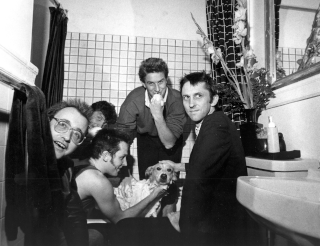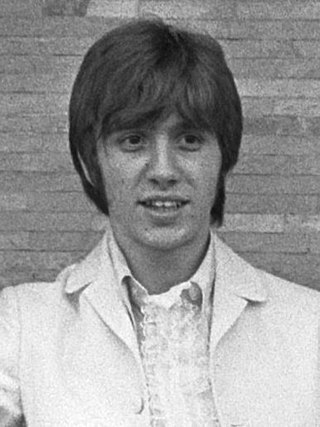Related Research Articles

Men at Work are an Australian rock band formed in Melbourne in 1978 and best known for breakthrough hits such as "Down Under", "Who Can It Be Now?", "Be Good Johnny", "Overkill", and "It's a Mistake". Its founding member and frontman is Colin Hay, who performs on lead vocals and guitar. After playing as an acoustic duo with Ron Strykert during 1978–1979, Hay formed the group with Strykert playing bass guitar and Jerry Speiser on drums. They were soon joined by Greg Ham on flute, saxophone and keyboards, and John Rees on bass guitar, with Strykert switching back to lead guitar. The group was managed by Russell Depeller, a friend of Hay, whom he met at La Trobe University. This line-up achieved national and international success during the early to mid-1980s.
Killing Heidi are an Australian rock band, formed in Violet Town, Victoria in 1996, initially as a folk-pop duo by siblings Ella and Jesse Hooper. The band has released three studio albums: Reflector, which reached No. 1 on the ARIA Albums Chart, Present and Killing Heidi. Their top 20 singles are "Weir", "Mascara", "Live Without It", "Outside of Me" and "I Am". At the ARIA Music Awards of 2000 they were nominated in seven categories and won four trophies: Album of the Year, Best Group, Breakthrough Artist – Album and Best Rock Album for Reflector. At the APRA Music Awards of 2001 Ella and Jesse Hooper won Songwriter of the Year. The group disbanded in 2006, with Ella and Jesse taking a lower profile with an acoustic folk duo, The Verses. In 2016, it was announced that the band would be reforming to celebrate its 20th anniversary, and the band have continued to tour since.

Mental As Anything are an Australian new wave and pop rock band that formed in Sydney in 1976. Its most popular line-up was Martin Plaza on vocals and guitar; Reg Mombassa on lead guitar and vocals; his brother Peter "Yoga Dog" O'Doherty on bass guitar and vocals; Wayne de Lisle on drums; and Andrew "Greedy" Smith on vocals, keyboards and harmonica. Their original hit songs were generated by Mombassa, O'Doherty, Plaza and Smith, either individually or collectively; they also hit the Australian charts with covers of songs by Roy Orbison, Elvis Presley, and Chuck Berry.

Daryl Braithwaite is an Australian singer. He was the lead vocalist of Sherbet. Braithwaite also has a solo career, placing 15 singles in the Australian top 40, including two number-one hits: "You're My World" and "The Horses". His second studio album, Edge, peaked at No. 1 on the ARIA Albums Chart, No. 14 in Norway and No. 24 in Sweden.
Deadstar were an Australian alternative rock band formed in August 1995 by Peter Jones on drums and percussion; Caroline Kennedy on lead vocals and guitar; and Barry Palmer on guitar and bass guitar. They released three studio albums, deadstar, Milk and Somewhere Over the Radio. Two singles reached the top 100 on the ARIA Singles Chart, "Run Baby Run" and "Deeper Water", both in 1999. The group were nominated for three ARIA Music Awards. The group disbanded in 2001.

Stephen Carlton Wright was an Australian singer, songwriter, and musician. Called Australia's first international pop star, he is best known for being the lead singer of the Easybeats, who are widely regarded as the greatest Australian pop band of the 1960s.
Disco Montego was an Australian R&B and dance music trio. The Dowlut brothers Dennis and Darren, together with Tony Vass formed Kaylan in Melbourne in 1995. They released an R&B album No Commandments in 2000, which reached No. 23 in Australia and spawned three top 50 singles. In May 2001, they became the studio based group Disco Montego, and released further singles followed by Disco Montego in September 2002. Their production work included remixing Mariah Carey's "Boy " in 2004.

The Bo-Weevils are a psychedelic rock band blending psychedelic music, pop music, garage rock and rock music which formed in early 1985. Their early garage incarnation was a lot easier to classify and won fans easily, but the band evolved away from these roots from the late 1980s into more cerebral and accomplished directions. They released four studio albums, Where Particular People Congregate (1988), Destroyer of Worlds (1990), Reap (1992), and Burn (1994) before they semi-retired in 1999. Australian musicologist, Ian McFarlane described the group as "one of the first Australian bands of the 1980s to play wild, 1960s-inspired garage-punk".
Underground Lovers are an Australian pop-rock band whose sound encompasses elements of indie rock, electronic and shoegaze. Founding members Glenn Bennie and Vincent Giarrusso formed the group GBVG in 1988. By May 1990 they became Underground Lovers with Richard Andrew (drums), Maurice Argiro, and Philippa Nihill joining. At the 1992 ARIA Music Awards the group won Best New Talent for their debut self-titled album from March 1991. Their highest charting studio album, Dream It Down, reached the ARIA albums chart top 60. After released seven studio albums, they disbanded in 2002. They reformed in 2009 and subsequently issued three more studio albums. Richard Andrew died in October 2024, after being diagnosed with lung cancer.

Andrew Douglas Strachan is an Australian rock musician. In 1994, after growing up in Adelaide, he relocated to Melbourne, and in 2000 he became the drummer of Sydney-based alternative rock group, Pollyanna. In 2002, he joined fellow alternative rockers, The Living End; they have issued four Top 5 albums on the ARIA Charts, Modern Artillery, State of Emergency, White Noise and The Ending Is Just the Beginning Repeating.
Frederick John Negro is an Australian satirist, musician, songwriter, and cartoonist. He has fronted numerous rock, punk and country bands.

Robert Derwent Garth Forster is an Australian singer-songwriter, guitarist and music critic. In December 1977 he co-founded an indie rock group, The Go-Betweens, with fellow musician Grant McLennan. In 1980, Lindy Morrison joined the group on drums and backing vocals, and by 1981 Forster and Morrison were also lovers. In 1988, "Streets of Your Town", co-written by McLennan and Forster, became the band's highest-charting hit in both Australia and the United Kingdom. The follow-up single, "Was There Anything I Could Do?", was a number-16 hit on the Billboard Modern Rock Tracks chart in the United States. In December 1989, after recording six albums, The Go-Betweens disbanded. Forster and Morrison had separated as a couple earlier, and Forster began his solo music career from 1990.
John Martin Armiger was an Australian musician, record producer and composer. He was one of the singer-songwriters and guitarists with Melbourne-based rock band the Sports from August 1978 to late 1981, which had Top 30 hits on the Kent Music Report Singles Chart with, "Don't Throw Stones" (1979), "Strangers on a Train" (1980) and "How Come" (1981); and Top 20 albums with Don't Throw Stones, Suddenly and Sondra (1981).

Nicholas Caruana, also known as Nicky Bomba, is an Australian musician and singer-songwriter. He is the leader of the ARIA Award-winning Melbourne Ska Orchestra, frontman of his band, Bomba, as well as the former drummer and percussionist of John Butler Trio. He has performed in other acts and as a solo artist. His youngest sister, Danielle Caruana,, is married to his former bandmate, John Butler. His older brother, Michael Caruana, is a member of Bomba and of Mama Kin's backing band.
Little Heroes were an Australian band formed in 1980, by founding mainstay Roger Hart on lead vocals and guitar. They released three studio albums, Little Heroes, Play by Numbers and Watch the World. Their highest charting hit, "One Perfect Day", which was released in 1982, reached No. 12 on the Kent Music Report Singles Chart. Their other charting singles are "Young Hearts" (1982), "Watch the World" and "Bon Voyage". They disbanded in June 1984.
Jaime Robbie Reyne is an Australian singer-songwriter and actor.
James Kevin Hocking otherwise known as Jimi the Human is an Australian musician. He has been a member of hard rock groups, The Angels (1988) and The Screaming Jets. As a solo artist he has fronted various backing bands playing hard rock, electric and acoustic blues by providing lead guitar, vocals, mandolin and keyboards. In 2005 he won the Solo/Duo category at the International Blues Challenge in Memphis, Tennessee.
Richard Arnold Pleasance is an Australian rock musician and producer. He was a founding member of Boom Crash Opera on guitar, bass guitar, vocals and as a songwriter in 1985; they released three albums before Pleasance left in 1992. Their hit Australian Recording Industry Association (ARIA) singles, "Great Wall" and "Onion Skin" were co-written by Pleasance, who also co-produced their second album, These Here Are Crazy Times. His debut solo release, Galleon received four nominations at the ARIA Music Awards for 1992. Pleasance composed the theme music for Australian television series, SeaChange (1998–2001), for 2006 feature film Kenny and more recently he composed the theme music for the prison drama series Wentworth. Pleasance is married to Michelle and, as from May 2009, he was living in Hepburn Springs, Victoria where he has a recording studio.

Alcotomic was a power pop band formed in Melbourne, Victoria, February 1996. Initially, the band was called Dozer and the first recording session commenced at the original Birdland Recording Studios in High Street Prahran, Melbourne with record producer Lindsay Gravina. This line up consisted of John Freeman Baxter (Holocene) on vocals and guitar, Denny Brereton on bass and Stephen Boyle (Moler) on drums.
Marcia Louise Howard is an Australian multi-instrumentalist, singer-songwriter, academic, and music educator. She was a long-term member of folk-rock group, Goanna on vocals and keyboards. Howard has released five solo albums to date and was a contestant on The Voice in 2016.
References
- 1 2 Campbell, Vic (March 1994). "Young Elders – Non-nonsense Pop in the Pubs". On Being: 37–38.
- 1 2 Parisi, Michael (13 November 1991). "Reel-to-Real". Inpress: 65.
{{cite journal}}: Cite journal requires|journal=(help) - ↑ Spencer, Chris (1996). The who's who of Australian rock (4 ed.). Informit, Royal Melbourne Institute of Technology. p. 570. ISBN 9780864445599.
- ↑ "Young Elders – Fly Monica Fly". Tag Tuner. Retrieved 3 April 2010.
- ↑ Masterson, Andrew (21 April 1995). "Going It Alone". Melbourne: The Age (EG). p. 10.
- ↑ Bassett, Daryl (25 May 1994). "Young Elders – Fly Monica Fly". Inpress. p. 37.
- ↑ "'Fly Monica Fly' at APRA search engine". Australasian Performing Right Association (APRA). Retrieved 3 April 2010.
- 1 2 Eliezer, Christie (4 May 1996). David Sinclair (ed.). "Global Music Pulse – Australia". Billboard . p. 49. Retrieved 17 August 2012.
- ↑ Seles, Monica; Richardson, Nancy Ann (1996). Monica – From Fear to Victory. HarperCollinsPublishers. p. 205. ISBN 9780060186456.
- ↑ "Seles Swings into Smash Hit". Melbourne: Herald-Sun. 3 March 1996. p. 126.
- ↑ "A musical fairy tale". Melbourne: Crosslight (UCA). October 1997.
- ↑ "Monica Seles meets Young Elders". ESPN. January 1996. Retrieved 3 April 2010.
- ↑ Grimson, Tracey (June 1999). "The Monicas – Celebration". Rolling Stone Australia : 95.
- ↑ Best, Bruce (May 2000). "The Monicas end this tune". Melbourne: Crosslight (UCA). p. 3.
- ↑ "Brief updates". Alive Magazine: 45. May 2000.
- ↑ "Young Elders – Fly Monica Fly". ACMusic. 17 October 1999. Archived from the original on 30 August 2000. Retrieved 16 August 2012.
- ↑ "The Monicas – Celebration". ACMusic. 17 October 1999. Archived from the original on 30 August 2000. Retrieved 16 August 2012.
- ↑ "'Flags of Metal' at APRA search engine". Australasian Performing Right Association (APRA). Retrieved 3 April 2010.
- ↑ "Various artists: indie compilations etc..." wolf's kompaktkiste. Retrieved 3 April 2010.